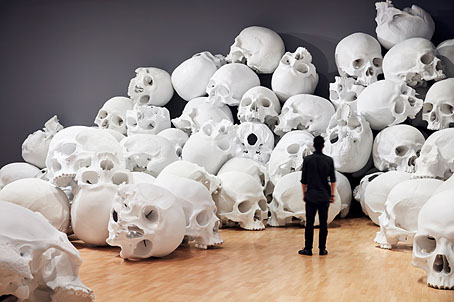The Invisible World of Beautify Junkyards will be the next release on the Ghost Box label in March 2018. Design by Julian House.
• Tantalising discovery of the week was Alphons Sinniger’s Eno (1974), a 24-minute film about post-Roxy Music Brian Eno which shows (among other things) the recording of Here Come The Warm Jets. The film is a scarce item that appeared briefly on YouTube before being yanked. Copies have been reposted (see here) although they may not stay around for long.
• Nosferatu the Shapeshifter: An inventory of intertitles, prints and premiéres. A page that includes some detail about Die zwölfte Stunde. Eine Nacht des Grauens (The Twelfth Hour: A Night of Horror), a seldom-seen reworking of Murnau’s film from 1930 which added sound, additional scenes (none of them by Murnau) and a happy ending.
• At Dennis Cooper‘s: Entry Level: Luchino Visconti’s “German Trilogy”: The Damned, Death in Venice, Ludwig (1969–1973).
• “3,500 occult manuscripts will be digitized and made freely available online, thanks to Da Vinci Code author Dan Brown.”
• From 2015: Watch Alejandro Jodorowsky give a tarot reading (for Nicolas Winding Refn).
• Portals of London: “Towards a catalogue of London’s inter-dimensional gateways”.
• At Spoon & Tamago: Gigantic sculptures by Kenji Yanobe of cats wearing helmets.
• At the BFI: Adam Scovell on 10 great “urban wyrd” films.
• At Swan River Press: Our Haunted Year: 2017.
• Portals (2001) by Bill Laswell | Portals And Parallels (2010) by Belbury Poly & Moon Wiring Club | Abysmal Cathedrals Arise!—Beyond The Quivering Portal—Minds On Fire (2012) by The Wyrding Module





